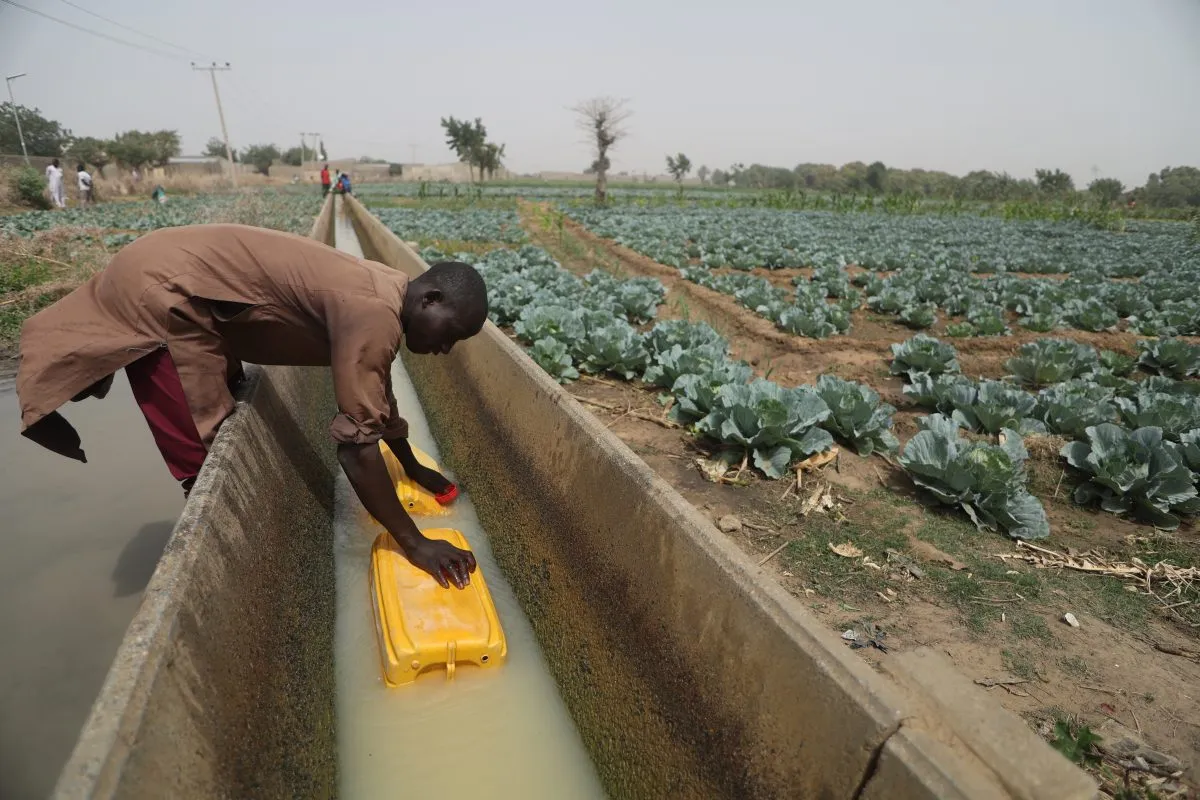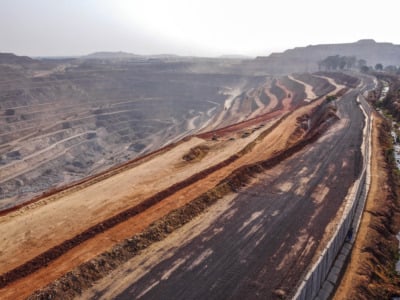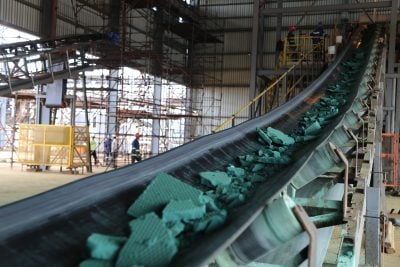One of the most glaring problems in African agriculture is a lack of irrigation. Water, along with sunlight, is the most basic ingredient for growing crops; therefore, without irrigation to provide enough water, yields are likely to fall well below their potential. Farmers that lack irrigation are also much more vulnerable to drought, which can bring devastating crop failures.
Africa lags well behind other regions on access to irrigation. A 2018 report published by the Malabo Montpellier Panel of agricultural experts states that only 6% of cultivated land is irrigated in Africa. This compares to 14% in Latin America and 37% in Asia.
Irrigation is largely confined to the north of the continent (Egyptian farmers have relied on irrigation from the Nile for thousands of years), as well as a few highly productive areas such as South Africa’s Western Cape.
The reliance on rainfed agriculture is a growing problem given the changing climate. Droughts are becoming longer and more frequent. More than 50 million people in the Horn of Africa region are currently classified as food insecure, owing in large part to a drought that began in 2020.
The good news is that a range of solutions are becoming more widely available. In particular, solar-powered pumps are set to play a growing role. The challenge now is to scale-up these technologies, while ensuring that finite water resources are shared equitably between farmers and other water users.
From sun to water
There are several ways to provide irrigation. These include huge infrastructure projects that divert water into networks of canals and ditches, such as the Gezira Scheme in Sudan. Largely constructed during British rule, the scheme was designed to provide water to commercial cotton plantations.
Yet given that the overwhelming majority of agricultural land in sub-Saharan Africa is farmed by smallholders, smaller-scale solutions are more applicable.
“In general, drip irrigation which allows you to water the crop and not weeds, is very suitable for small farms in Africa,” says Prosper Chikomo, a Zimbabwean entrepreneur and founder of irrigation startup Prosper on Farms. “I am all in favour of low-tech solutions,” he adds.
Many African farming operations that do have access to irrigation currently make use of diesel-powered pumps, which extract water from boreholes or from rivers or lakes. However, these are highly polluting and are expensive to operate, especially in countries where diesel prices have spiked in recent years.
An emerging alternative is to use pumps powered by solar energy. Giacomo Falchetta, a research scholar at the International Institute for Applied Systems Analysis, sees “strong potential” for solar irrigation to be widely used across Africa. Especially in countries where governments are proactive in promoting renewable energy – such as Kenya, Rwanda and Ghana – Falchetta says there are good prospects for “massive uptake” of solar irrigation.
He notes that the upfront cost of solar-powered pumps is still slightly higher than diesel alternatives, but are much cheaper to operate. “The saving is considerable,” he says, estimating that a smallholder could save hundreds of dollars per year by using a solar-powered pump.
The challenge, Falchetta says, is to find business models that allow users to spread the cost of installing solar irrigation. Much like with rooftop solar devices, which are increasingly used for electricity generation by homes and businesses across the continent, a number of companies are now emerging that offer pay-as-you-go or leasing models.
One such company is SunCulture, which announced a $12m dollar equity investment from InfraCo Africa, part of the donor-funded Private Infrastructure Development Group, in early April as part of its Series B fundraising round. SunCulture is aiming to extend solar irrigation to hundreds of thousands of smallholder farmers by 2030. It also provides tech-based services, including weather forecasting and advice on crop selection, to its users.
Karoney Jerotich, investment manager at InfraCo Africa, says that solar powered irrigation can be a “game changer” for farmers in parts of the continent where grid electricity is unstable. The key challenge, she agrees, is affordability.
SunCulture seeks to address this by offering ‘pay-as-you-grow’ options, where farmers pay for pumps in monthly instalments. As a result, however, Jerotich notes that the company has a “huge credit risk”, meaning it has had to rely mostly on a concessional capital from InfraCo and other sources as it seeks to scale-up.
Chikomo also states that African irrigation startups face huge hurdles in raising capital. He laments that Silicon Valley firms appear to be able to easily raise millions of dollars for eccentric ideas, while much more impactful businesses in Africa are starved of cash.
“When most Western investors invest in African startups, they want to invest mostly in fintech, not African food security,” he says.
He is sceptical, meanwhile, that business models that rely on smallholders taking on debt are well-suited to rural areas of Africa. His business, Prosper on Farms, instead offers to supply free irrigation systems to farmers; the farmer will take ownership system if they can meet production targets over a set period of time.
Managing water
Extending irrigation across sub-Saharan Africa is undoubtedly vital to raise rural incomes. There is a risk, though, that efforts to increase access to irrigation could be too successful. Particularly in water stressed regions, greater use of water on farms could mean less water is available for hydropower generation or for municipal water users.
Falchetta warns that this “tragedy of the commons” scenario has played out already in parts of India where access to irrigation has expanded rapidly in recent decades. Strong water governance is needed, he says, including in managing water sources that extend across national boundaries.
Farmers in South Africa’s Western Cape are also used to experiencing competition over water. The share of water allocated to agriculture had to be cut during the infamous 2018 drought, during which Cape Town came close to ‘Day Zero’ when municipal piped water supplies would run dry.
Partly in an effort to encourage better water use, the Western Cape government has provided free access to an online remote sensing tool called FruitLook since 2011. This provides users with access to high-resolution satellite imagery of their farms on a weekly basis; the satellites detect rates of evapotranspiration and measure how efficiency plants are using water. Farmers can use the data to help assess whether they are under-using or over-using their irrigation systems.
“The whole goal is to get away with less water,” says Dianca Yssel, commercial head for FruitLook at the tool’s local implementation partner Blue North Sustainability, and still produce the “same crop or more crop at the end of the day.” She says that the “extra layer” of information helps farmers to plan how they use irrigation more effectively.
Many other methods are being applied around the world to improve irrigation systems so that they waste less water. These often rely on advanced technologies, such as using soil moisture sensors to automatically adjust watering schedules.
For most of Africa, however, the more immediate priority is to bring some form of irrigation within reach of smallholder farmers. The problem of ensuring that improved irrigation on farms does not exacerbate other problems is still a challenge for another day across most of the continent.
“For agriculture to succeed, you need irrigation,” says Chikomo. “Just look at Israel, it is in a desert and yet it is a world leading exporter of food. You cannot solve food and economic problems in Africa without increasing access to irrigation.”
Want to continue reading? Subscribe today.
You've read all your free articles for this month! Subscribe now to enjoy full access to our content.
Digital Monthly
£8.00 / month
Receive full unlimited access to our articles, opinions, podcasts and more.
Digital Yearly
£70.00 / year
Our best value offer - save £26 and gain access to all of our digital content for an entire year!

 Sign in with Google
Sign in with Google 



